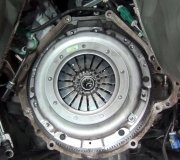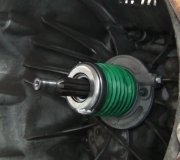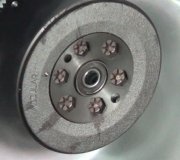Recalls are not issued just because you're having a lot of trouble. They are only initiated when a large number of a certain model has a high likelihood of developing the same safety or emissions-related problem, or for some manufacturers, a customer satisfaction issue. Service bulletins are also issued when a lot of cars may develop an elusive problem that initially defies a quick diagnosis. Those are just informational so mechanics can fix a car faster, but those are not recalls and no attempt is made to contact the owners of those models.
It isn't likely the engine bearings are worn out yet at the mileage you listed, unless the car has not had proper oil changes and other maintenance. When a knocking does occur that's caused by a worn bearing, it won't last very long like that. If you're real lucky, you might get a few hundred miles before the damage escalates very quickly and a part breaks and the engine locks up. There are other things that can cause a knocking noise. Some of them are relatively minor but can turn serious if they're ignored. A loose or broken vibration damper is one fairly common cause that comes to mind. Also, engines that use timing chains with tensioners can develop looseness and rattle against a cover. You didn't say which engine you have, but all of them for your model use a chain. You should be able to hear that with the hood open and you're standing next to the running engine. A mechanic can differentiate that noise from a connecting rod bearing knock. A loose timing chain can last for a pretty long time but it will also cause slightly reduced power and fuel mileage.
There is a tool you might be able to borrow or rent from an auto parts store that borrows them called the "Chassis Ear". It is a set of six microphones, a switch box, and headphones. You clip the microphones to suspect points, then drive around while listening with the headphones. You can move the microphones around to zero in on the source of the noise. Be aware that many mechanics have never seen or even heard of this tool. Suspension and alignment mechanics use it to find rattles, squeaks, and other noises.
Wednesday, January 29th, 2014 AT 10:57 AM


